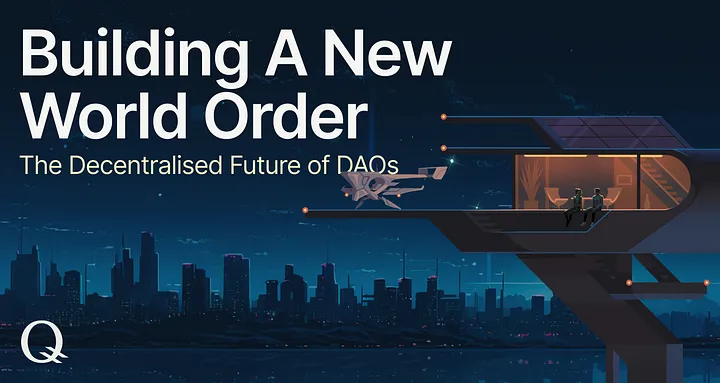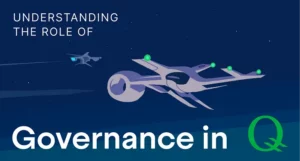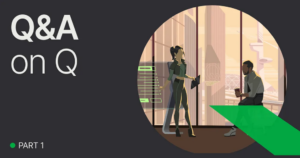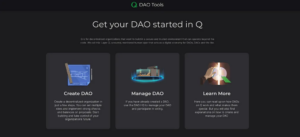An in-depth analysis of the transformative potential of Decentralized Autonomous Organizations (DAOs). This article navigates through DAOs’ paradigm-shifting capabilities, the DAO Protocol’s role, and Q’s mission to support DAOs on their path into a robust, transparent, and sustainable future.
There’s no sugar-coating it: Decentralised Autonomous Organisations (DAOs) face a crisis. The reasons for their struggle are numerous — coordination challenges, sketchy business models, and the grim spectre of legal overreach, to name a few.
You may recall the infamous Ooki DAO case, where a U.S. judge classified a DAO as a “partnership,” thereby making all members liable. This unfortunate incident serves as a chilling reminder of the potential legal pitfalls DAOs could stumble into.
However, this is not a signal of despair. Instead, it’s an opportunity to reevaluate, innovate, and overcome these challenges. DAOs can revolutionise how humans coordinate, decentralise decision-making, and democratise resource access. But to realise this potential, DAOs must be reshaped and reinforced with a robust governance framework.
Here, I propose a roadmap towards an efficient, transparent, and resilient DAO ecosystem: the three pillars of DAO Constitutions, Expert Panels, and On-chain Voting.
Let’s dive deeper.
DAO Constitutions are akin to a nation’s constitution. These are comprehensive documents that outline the operations of a DAO in clear, comprehensible language. They serve as a beacon of truth, guiding new and existing members about the DAO’s functionality, roles, and decision-making processes. They also detail handling disagreements and conflicts within the DAO — an often overlooked yet critical aspect of maintaining harmony and productivity.
But, you may wonder why you should care about DAO Constitutions.
Two reasons: security and legal resilience.
Firstly, a constitution provides security and transparency to all members. It lays down the rules of engagement, the roles and responsibilities of members, and how decisions are made. It ensures that the code follows the decisions of the DAO, not vice versa. This is crucial for creating an environment of trust and certainty within the DAO, ensuring its sustainability in the long run.
Secondly, if done right, a constitution safeguards DAOs from legal overreach. Without clear rules and references, a DAO could be classified as anything, opening the floodgates for legal disputes. An enforceable constitution provides legal cover by establishing the structure and decision-making process of the DAO. This clarity can help deter potential lawsuits and prevent judicial bodies from imposing their jurisdiction on the DAO.
Moving on to the next pillar: Expert Panels.
Much like departments in a traditional organisation, these panels are groups of individuals appointed by the DAO for specific tasks or functions. They bring their expertise, lend their voice to important decisions, and can even represent the DAO externally. By setting up such panels, DAOs manage their operations and systematically drive towards decentralisation.
Lastly, On-chain Voting is a mechanism that ensures transparent, secure, and immutable decision-making within a DAO. In a truly decentralised organisation, no single member, irrespective of their influence, should be able to manipulate or pressure the decision-making process. On-chain voting serves as a record of decisions, discouraging underhand tactics and ensuring a fair governance system.
So, where do we stand now?
DAOs are undoubtedly facing turbulent times. But they are far from irreparable. Let’s work together to build a new generation of DAOs that are secure, transparent, and resilient. DAOs that can withstand legal challenges and make a significant impact on the world. DAOs change how humans coordinate and collaborate.
By integrating DAO Constitutions, Expert Panels, and On-chain Voting, we can create DAOs that don’t merely survive but thrive in the face of adversity.
The future of DAOs isn’t a dream; it’s a vision within our grasp. But to make this vision a reality, we must roll up our sleeves, adapt, innovate, and commit ourselves to create a truly decentralised future.
The revolution is just beginning. Are you ready to join?
About Q
Q is a new type of economy, providing a framework for decentralised organisations to flourish. Based upon a novel Layer-1 public blockchain, complete with governance infrastructure, Q is a chain that unlocks the new evolution of organisations. Any protocol, community, or DAO can integrate with Q, instantly improving its governance’s quality and security. The human-centered, plug-and-play governance system makes it easy to launch bespoke, transparent, and fair processes for decision-making, enforcement, and dispute resolution. Q is a cooperation backstop when “code is law” cannot answer non-deterministic questions. It allows for automated efficiency and human complexity to co-exist, making organisations incorruptible and prepared for the unknown. Q takes us beyond code, beyond yes and no, into an incorruptible future.






Leave a Reply